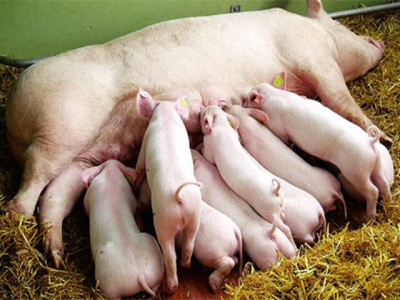Thermal images can be used to detect disease in pigs

Measuring the radiated temperature of a group of pigs by infrared themography may be a useful tool for early detection of disease as some Canadian researchers discovered.
Infrared themography (IRT) technology is already being used in a similar way at airports to screen people for possible disease, but it also has a role in veterinary diagnostics. It offers a way of measuring the temperature of animals without needing to handle or restrain them.
The researchers used vaccination as a model for disease, because it induces an immune response in the animals. Groups of weaned pigs were either treated with an intra-muscular vaccine, injected with saline as a placebo or left untreated.
Using an infrared camera to detect fluctuations in pigs
An infrared camera fixed to the ceiling directly above the pen recorded thermal images of the groups of pigs at five-minute intervals. Higher temperatures were recorded when the pigs clustered together and this behavior was seen more frequently in the groups of vaccinated pigs.
The maximum image temperature was significantly higher in vaccinated animals compared with control and placebo-injected animals. Temperature increase in the vaccinated animals occurred as early as three hours post-vaccination, peaked at 10 hours and remained elevated for up to 20 hours.
The researchers also investigated the effect of prevalence of disease on the ability of IRT to detect a thermal response. A thermal response to vaccination was detected in a pen of 24 to 26 animals when less than 10% of the animals were vaccinated.
Radiated temperature is useful for detecting fever induced diseases
These results suggest that measuring the radiated temperature of groups of animals could be a useful tool for detecting fever-inducing disease in pig barns and IRT offers an automated way of doing this.
Cook, N.J., Chabot, B., Lui, T., Bench, C.J., and Schaefer, A.L. (2014). "Infrared thermography detects febrile and behavioural responses to vaccination of weaned piglets."
Có thể bạn quan tâm
 Sow colostrum quality and progeny performance the focus of NPD at Devenish
Sow colostrum quality and progeny performance the focus of NPD at Devenish Trials on a Devenish product for sows are now underway on commercial farms in the UK and Denmark.
 Project to investigate parasite control in organic pork
Project to investigate parasite control in organic pork USDA awards $499,542 for three-year study of manure and pasture management strategies that can control swine parasites in organic swine operations.
 Why methionine is valuable for youngest pigs
Why methionine is valuable for youngest pigs Getting the young pig off to the right start and keeping it healthy and growing is the key to a high-quality end product as it relates to harvest hogs